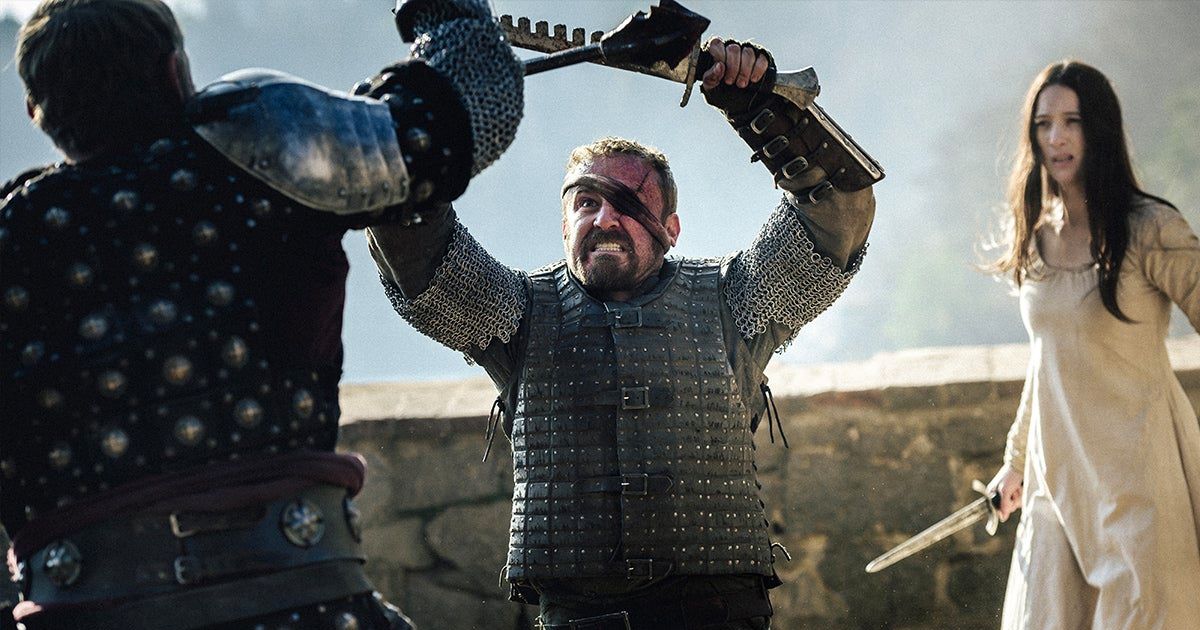Medieval lives up to its title as a barbaric tale of bloody conflict, political machinations and religious oppression. Ben Foster leads an accomplished ensemble as Jan Žižka, a historical Czech warrior known for his innovative combat strategies. The violence is gut-wrenching. Heads are beaten to a pulp, limbs are hacked, women are assaulted and innocents are pierced like kebabs as deceitful nobles vie for control of Europe. If only the script matched the brutal action scenes. Medieval realistically depicts brutality but struggles to form a compelling story.
The film opens in 1402 Italy with Lord Boreš (Michael Caine) on his way to Rome. His voice-over explains that Europe is in ruins after the death of Charles IV. A new emperor is needed to unite the warring factions and end the suffering of the people. Two popes have divided the Catholic Church. He considers the Pope in France an impostor. Boreš hopes to win favor with the Pope in Rome. He wants Wenceslaus IV of Bohemia (Karel Roden), the eldest son of Charles IV, to be crowned the rightful Holy Roman Emperor.
Žižka and his men rescue Boreš from an ambush. The assassins were hired by Lord Henry Rosenberg (Til Schweiger). Boreš returns to Prague to meet Rosenberg in the presence of Wenceslaus IV and his younger brother, King Sigismund of Hungary (Matthew Goode). They need Rosenberg’s money to fund their rule. But the rich Rosenberg will not be influenced by a weak king.
Boreš has a drastic idea to force Rosenberg’s cooperation. He hires Žižka to kidnap Lady Katherine (Sophie Lowe), Rosenberg’s betrothed. He reveals a secret to Žižka about why Katherine is so important. Rosenberg unleashes the evil Torak (Roland Møller) to get his betrothed back. Katherine witnesses Rosenberg’s horrific treatment of his farmers. She begins to understand why Žižka despises the nobility and the church. The plot thickens as Žižka tries to take Katherine to Boreš. King Sigismund has ulterior motives and also needs Rosenberg’s cooperation. Katherine is the main pawn of all their ambitions.
Dialogue in the Middle Ages
The biggest problem is the dialogue that connects the pieces. Medieval has multiple supporting characters with their own agendas. The film jumps back and forth between them like a ping-pong ball. Apart from Sigismund, who feels destined to rule by God, the other nobles have little exposition. They are clearly hungry for power, but lack depth and are ill-defined. Wenceslaus IV has a huge interest in orchestrating Katherine’s kidnapping. He mumbles a few thin lines and then fades into the background. It also doesn’t make sense for Boreš to disappear throughout the second act.
Medieval tries to follow a similar trail to Mel Gibson’s brave heart. The heroic fighter and regal lady become enamored with fending off evil aristocrats. Foster and Lowe have little chemistry together. It doesn’t help that the plot constantly lets her escape and be recaptured. There is little time for them to establish a viable connection. Žižka is a beast on the battlefield, but understated as the protagonist. The character should have been more dynamic and intense for cinematic reasons. That’s a knock on the director and the script. Foster has proven on-screen presence.
Medieval manages to portray the brutal Middle Ages and the tactical prowess of Jan Žižka. You get tired of war, despair and submission. Unfortunately, it misses the mark everywhere else. The plot and characters don’t resonate when they should have had an impact.
Medieval is a production of JBJ Film, Genesy, Double Tree Entertainment, KORD.Media and Wog Film. It will be released in theaters on September 9 by The Avenue Entertainment.
